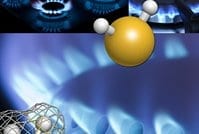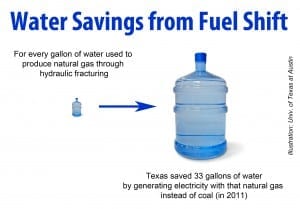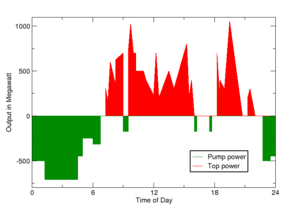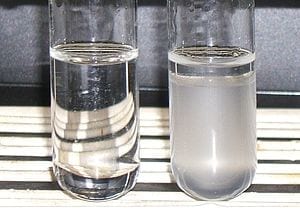
“It’s a way to improve the safety and purity of the gas, but at the same time be more energy efficient.”
Along with affordable and reliable energy, natural gas can harbor an extremely toxic threat—hydrogen sulfide—which must be removed before the gas can be used safely. In a surprising twist, PNNL researchers in search of carbon dioxide capture solutions have discovered a way to remove hydrogen sulfide from natural gas using a water-free solvent that promises to be much more effective and efficient than current techniques.
“We hope that this is a new ‘sweetening’ solvent, so to speak, where we’re able to be more energy efficient and more selective at removing hydrogen sulfide,” said Dave Heldebrant, who is the principal investigator for the project. “It’s a way to improve the safety and purity of the gas, but at the same time be more energy efficient.”
Why it matters
Natural gas contains varying levels of hydrogen sulfide, so-called “sour gas” for its poisonous properties, that can be deadly even at low concentrations and corrosive to pipelines and equipment. This research delivers a new hybrid chemical/physical solvent for removing hydrogen sulfide that is three times more selective than the industry standard solvent and is much more energy efficient—saving dollars, conserving energy, and potentially opening up natural gas resources worldwide.
Methods
Initially, researchers were investigating methods to remove CO2 from natural gas using a water-free chemical solvent–significant because chemical-based CO2 removal from natural gas currently requires millions of pounds of water-based amine solvents per hour that must be boiled to release the CO2. That requires a lot of energy. Alternative methods include forcing the CO2 to dissolve into a “physical” solvent using the high pressure of the natural gas as the driving force.
“Processing chemical solvents in water on an industrial scale is extremely energy intensive, and physical solvents generally have lower selectivity,” Heldebrant said. “Our thought was: Can we make this process better by first getting rid of the water and somehow combining the two processes?”
Researchers began with a base and alcohol combination that traditionally does not react with CO2 at atmospheric pressure, but when they added higher pressures of CO2, the blend chemically reacted with the CO2 to make a liquid carrier. Researchers then reduced the pressure and observed the chemically reacted CO2 being released from the solvent without heat. This first-of-a-kind hybrid approach combining chemical selectivity with pressure-based CO2 removal delivered a major breakthrough: demonstrating that CO2 could indeed be removed from natural gas without water.
Encouraged by the results with CO2, researchers moved on to other naturally occurring compounds found in natural gas, including hydrogen sulfide. That’s when they really hit the sweet spot, discovering that the water-free solvent was even more effective at hydrogen sulfide capture.
“Nobody had ever seen a chemical solvent react with hydrogen sulfide in the absence of water and still remain a liquid. It had never been published,” Heldebrant said. “We set out and proved that the reaction was occurring and the produced liquid further absorbed more hydrogen sulfide, bringing the total capacity up to 43 percent by weight. You’re getting the same capture that you would have in the water-based solution, but now you don’t need the water.”
Analysis under real-world natural gas processing conditions has confirmed the initial results and indicates that the hybrid solvent has excellent potential for hydrogen sulfide removal, absorbing it 10 times more selectively than CO2 and having a much higher selectivity for hydrogen sulfide than the industry standard solvent. What’s more, this unique hybrid solvent favors hydrogen sulfide removal, while all other solvents favor CO2.
The Latest Bing News on:
Removing hydrogen sulfide from natural gas
- 5 Dead After Inhaling Hazardous Gas at a Water Plant in Sicilyon May 6, 2024 at 12:13 pm
An official said the workers were killed by hydrogen sulfide, which is toxic in high concentrations. Italian officials and unions repeated urgent calls for better workplace safety.
- Record settlement reached in gas flare caseon May 2, 2024 at 12:05 pm
A state agency reached a settlement agreement with an oil and gas company as New Mexico continues to crack down on air pollution from that sector. The New Mexico Environment Department announced ...
- New Mexico reaches record settlement with company over natural gas flaringon April 29, 2024 at 4:56 pm
New Mexico has reached a record settlement with a Texas-based company over air pollution violations at natural gas gathering sites ... emissions that included hydrogen sulfide, sulfur dioxide ...
- New Mexico reaches record settlement over natural gas flaring in the Permian Basinon April 29, 2024 at 3:08 pm
New Mexico has reached a record settlement with a Texas-based company over air pollution violations at natural gas gathering sites in the Permian Basin.
- Oil and gas company agrees to $24.5 million settlement with New Mexicoon April 29, 2024 at 1:35 pm
Oil and gas company Ameredev II, LLC will pay New Mexico $24.5 million to settle alleged violations of state air regulations, the state's Environmental Department announced in a press release. It is ...
- New Mexico settles nearly $25M with Texas oil and gas firm over air quality violationson April 29, 2024 at 1:07 pm
It's the largest settlement the New Mexico Environment Department has reached for a civil oil and gas violation.
- Remedies for Foul Smelling Gason April 21, 2024 at 5:00 pm
Eating certain foods can also cause gas, such as: Foods high in fiber, such as beans, peas, and oat bran Foods with fructose (natural fruit ... smell is due to hydrogen sulfide, a sulfur ...
- Emma Braceon August 18, 2023 at 1:47 pm
She earned her PhD at Purdue University in the Department of Agricultural and Biological Engineering, where her dissertation focused on gas-liquid separations designs for removing hydrogen sulfide ...
The Latest Google Headlines on:
Removing hydrogen sulfide from natural gas
[google_news title=”” keyword=”removing hydrogen sulfide from natural gas” num_posts=”10″ blurb_length=”0″ show_thumb=”left”] [/vc_column_text]The Latest Bing News on:
Hydrogen sulfide removal
- A hidden danger lurks beneath Yellowstoneon May 8, 2024 at 6:30 am
A volcanic eruption at Yellowstone is unlikely anytime soon, but evidence is growing that a violent hydrothermal, or steam, explosion is possible.
- Washing Machine Smells: How to Get Rid of Themon May 7, 2024 at 8:16 am
We may earn revenue from the products available on this page and participate in affiliate programs. Learn More › Over time, unpleasant odors can emanate from a washing machine. These smells can have a ...
- New Mexico settles nearly $25M with Texas oil and gas firm over air quality violationson April 29, 2024 at 1:07 pm
It's the largest settlement the New Mexico Environment Department has reached for a civil oil and gas violation.
- Why Does My Washing Machine Smell? 6 Causes and How to Fix Iton April 18, 2024 at 8:01 am
Wondering why your washing machine smells worse than your dirty laundry? Here are six leading causes and easy fixes to get rid of pesky smells for good.
- Health officials: Odors near Kalamazoo factory increase health risks for neighborson May 9, 2023 at 7:30 am
Story revised from its original form to remove an incorrect OSHA hydrogen sulfide concentration guideline. Contact Keith Matheny: [email protected].
- Mining And Refining: Sulfuron September 28, 2022 at 12:21 am
The hydrogen sulfide that’s stripped out of the sour gas is very toxic to humans, and is particularly dangerous because at sufficiently high concentrations, it paralyzes olfactory nerves ...
- Interpreting Water Test Reportson February 6, 2022 at 3:14 am
Most softeners exchange calcium and magnesium for sodium, but they are designed only to remove hardness ... Water containing sulfate may also contain bacteria which produce hydrogen sulfide. The foul, ...
- The Types of Metals Used in the Oil & Gas Industryon August 16, 2020 at 8:32 am
Titanium is highly resistant to seawater, carbon dioxide and hydrogen sulfide corrosion ... as a catalyst in oil refinery processes that remove sulfur to produce low-sulfur gasoline and other ...
- Small Molecule Modulators of Hydrogen Sulfide Levels as a Novel Treatment for Heart Failureon September 26, 2017 at 7:25 am
We propose to develop a new class of drugs to treat heart failure based on modulation of the gasotransmitter hydrogen sulfide (H2S). Heart transplantation, the only currently effective treatment for ...
- Sulfur Water Control (Rotten Egg Odor in Home Water Supplies)on October 5, 2012 at 10:29 pm
Some people become accustomed to the odor and tolerate hydrogen sulfide levels of 5 and 6 mg/l. Visitors might find such water very unpleasant, however. Chlorine bleach can effectively remove medium ...
The Latest Google Headlines on:
Hydrogen sulfide removal
[google_news title=”” keyword=”hydrogen sulfide removal” num_posts=”10″ blurb_length=”0″ show_thumb=”left”]










